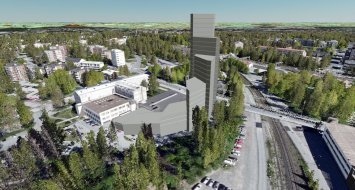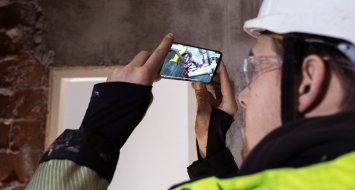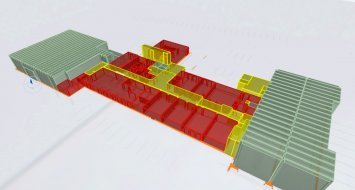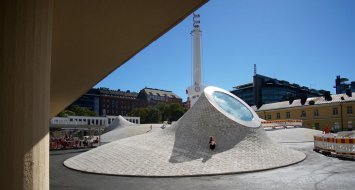Virtual reality opens new perspectives for communication and customer involvement in construction. Sweco, Varjo, and Teatime Research are together exploring the possibilities of VR using state-of-the-art technology.
“I think that the use of VR in construction is still at a visionary stage and useful practical applications are rare,” says Niina Jaatinen, Quality Assurance Manager at Sweco. “When we learned about Varjo’s exceptional technology, we thought that maybe it’s now time to start developing the really useful apps customers would yearn for.”
Finding the Killer Apps
Sweco started a KIRA-digi experimentation project with Varjo, the startup using patented Bionic Display™ technology. Jaatinen also wanted to have a project partner with a lot of experience in developing VR for the built environment, so Teatime Research, a software startup, was asked to participate.
The first phase of the project will identify the most promising use cases for high resolution VR and assess their feasibility and business potential. Once the project team has come up with a short list of applications, they will test them in case studies.
Jaatinen says that the project may come up with a killer app, but it might also conclude that none exist yet. There are many potential applications for VR in construction. We’ve already seen apps for design, marketing, sales, training, construction planning, and maintenance, but the breakthrough app is yet to come.
The project team has already identified several case studies. One of them is a control room simulation for the extension of the West Metro in Espoo. They also have a few industrial projects in the pipeline.
The Next Generation Experience
Will the new technology lead to real benefits in the construction process? Sakari Salli, CEO of Teatime Research, knows that just having a lot of ideas is not enough.
“Construction industry customers are now willing to examine new things, but they want working solutions,” says Salli. “Users have to integrate VR in their processes and thinking so that after the initial hype and enthusiasm, valid solutions still thrive.”
Teatime Research has gained a lot of experience in developing VR software for real estate marketing. With Varjo’s high-resolution VR headset, the user experience will improve considerably. The materials and textures look unprecedentedly realistic. You can even read small print in VR, something that has previously been impossible.
“The huge construction industry has been slow in adopting cutting-edge technologies, but this time that’s not the case,” says Markus Heinonen, Senior Business Analyst at Varjo. “It will be interesting to see how the use of next-generation VR technology will affect customer behavior.”
Expected Benefits
Simulation with previous VR headsets has not been satisfactory because of their low resolution. Being able to see even the smallest details could be a game-changer. In the control room pilot, users can read real-time IoT sensor data on the control panel’s gauges.
By replacing physical environments with virtual ones, remote simulation becomes possible. That’s a big cost-saver. The technology is useful in training operations and safety procedures.
VR as a communication tool can improve collaboration between project participants because the designs are visible in real-life size. High resolution models make design inspection quicker, which reduces the number of errors.
“To get the full benefits out of VR, we must make it business as usual. We’ll have to change our working habits accordingly,” Jaatinen anticipates.
Results in the Autumn of 2018
Because it is part of the government-supported KIRA-digi program, the VR experimentation project will be releasing its findings publicly. The project team will show demos at the WDBE 2018 summit in September. Attendees can personally experience Varjo’s mind-blowing VR technology in the exhibition area.
The project partners will gain useful experience from the project. The results will help Sweco to make decisions about further investments in the new processes and technology. In the autumn, both Varjo and Teatime Research will launch new products that will speed up the adoption of VR in the construction industry.
Other news

The Winning Teams at the AEC Hackathon Helsinki
The AEC Hackathon on September 7-9, 2018, was a part of Housing Fair Finland’s City Living...

City Development with Interactive 3D Models
The Finnish city of Hyvinkää has developed a unique internet service for collaborative 3D ...

BIM Meets Reality on the Construction Site
BIM models are mostly used by foremen on construction sites. But what if they could be mad...

How BIM Can Serve Building Owners
Building Information Models typically end their active life after the construction phase. ...

